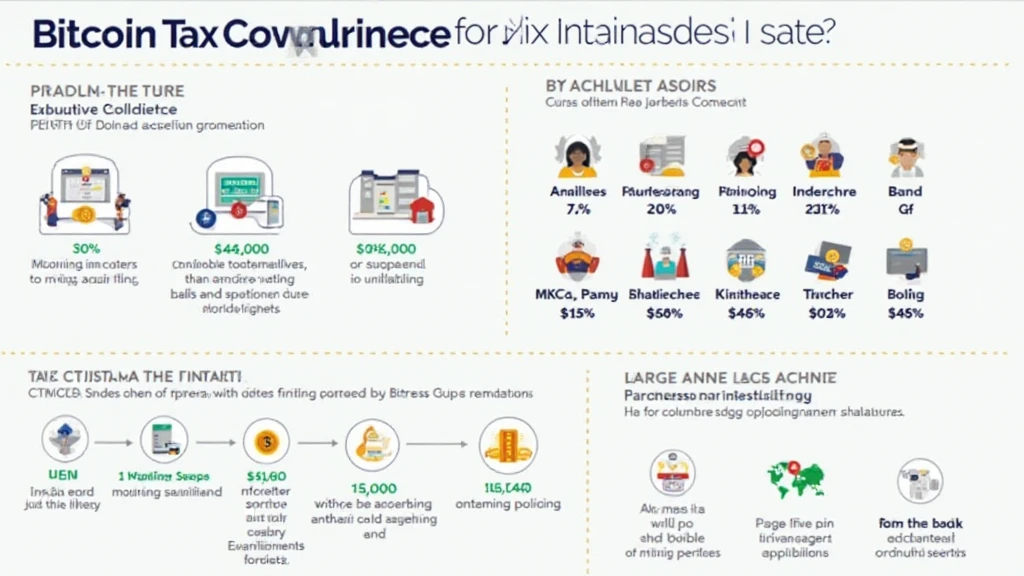Bitcoin Tax Compliance Frameworks: Navigating the Complex Landscape
With the crypto market surging by over 400% in the past three years, millions of people around the globe are entering the realm of Bitcoin and other digital assets. As a result, numerous taxpayers now face crucial questions regarding their compliance with tax regulations. If you’re a cryptocurrency investor or a business handling digital assets, understanding Bitcoin tax compliance frameworks is essential to avoid hefty fines and ensure your financial security.
Importance of Bitcoin Tax Compliance
As of recent reports from Chainalysis, the global crypto user base has increased to over 300 million. Amid this growth, authorities worldwide are implementing regulations that require comprehensive reporting and transparency for cryptocurrency transactions. Failure to comply can lead not only to penalties but also to legal repercussions. Here’s the catch: just as traditional finance faces compliance issues, the world of cryptocurrency is not immune.
What is Bitcoin Tax Compliance?
Bitcoin tax compliance refers to adhering to the laws and regulations set by tax authorities concerning the reporting of income derived from Bitcoin and other cryptocurrencies. This includes:

- Understand taxable events: Selling Bitcoin, trading it for other cryptocurrencies, or using it to purchase goods and services triggers a taxable event.
- Maintain accurate records: Document every transaction and valuation at the time of trading.
- Report gains and losses: Calculate the profit or loss for each transaction.
Global Regulatory Frameworks
Every country has its unique approach to Bitcoin taxation. For instance, in the United States, the IRS has issued guidelines categorizing Bitcoin as property, which entails capital gains tax obligations. In contrast, countries like Vietnam see emerging regulations focusing not only on taxation but also on the broader implications of digital currencies.
US Tax Regulations on Bitcoin
The IRS requires taxpayers to pay taxes on any profits made from Bitcoin trading. This involves:
- Long-term vs. Short-term gains: Profits from assets held for over a year are taxed at a lower long-term capital gains rate.
- Reporting and documentation: The use of IRS Form 8949, which is critical in itemizing all capital gains and losses.
Vietnam’s Stance on Cryptocurrency Taxation
According to recent studies, there has been a rapid growth of crypto users in Vietnam, estimating around 11 million as of 2023. The Vietnamese government is increasingly focusing on developing a regulatory framework for cryptocurrencies which includes:
- Tax liabilities: Users must declare their earnings and pay applicable taxes, much like traditional asset owners.
- Compliance frameworks: The government is working on creating clearer guidelines, ensuring that vulnerabilities in security and taxation are addressed.
Implementing Bitcoin Tax Compliance Framework
Implementing effective Bitcoin tax compliance frameworks can appear daunting. Here’s how to streamline the process:
- Secure a competent accountant or tax advisor: Experienced professionals can provide guidance tailored specifically to cryptocurrency tax obligations.
- Adopt tax software: Use platforms designed to track transactions and compute taxes automatically.
- Stay updated on regulations: Following local news and guidelines is crucial as regulatory landscapes evolve.
Case Study: Successful Tax Compliance
Take the case of a small business that integrated cryptocurrencies as payment modes. By adopting a tax compliance software, they accurately tracked their transactions, calculated possible tax liabilities, and ultimately maintained a good relationship with tax authorities.
Risks of Non-Compliance
Neglecting tax compliance increases the risk of audits, financial penalties, and even imprisonment in severe cases. Past records show countries taking stringent actions against individuals or entities that fail to comply with cryptocurrency regulations.
Future Trends in Bitcoin Tax Compliance
The landscape of Bitcoin taxation is continuously evolving. Authorities are likely to:
- Enhance enforcement: Expect stricter regulations and potential audits targeting crypto investors.
- Implement automatic tracking: Advanced analytics might be used to enhance tracking of blockchain transactions.
Challenges Ahead
As regulations become stricter, many investors face uncertainty. Navigating through this complexity while ensuring that you meet your tax obligations will be a necessity in the coming years.
Conclusion
In summary, understanding Bitcoin tax compliance frameworks is not merely about compliance, but also about securing your financial future. With evolving regulations globally, being proactive—whether through consulting experts or utilizing advanced tax software—can lead your crypto endeavors toward a prosperous path while keeping you on the right side of the law.
As the world of cryptocurrency continues to innovate, remaining informed and compliant will be essential to maximizing your investments and minimizing risks. With that in mind, stay ahead of the curve, and ensure that your financial literacy includes a comprehensive understanding of the necessary tax compliance frameworks.
For more information on navigating your crypto tax obligations, visit hibt.com. Remember, this article is not financial advice. Consult with local regulators to better understand your obligations.





